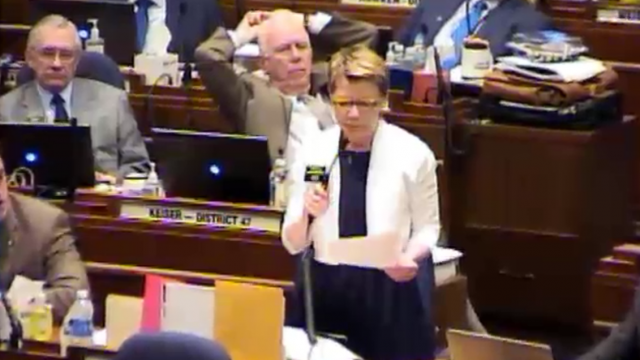Did The House Just Pass An Early Childhood Education Bill Or Daycare Subsidies?

But the state teachers union hated that aspect of the bill (you could hear some of the Democrats voice concerns about it during the Senate floor debate) and so it got axed. The bill before the House this morning, as explained by bill carrier Rep. Mark Dosch (R-Bismarck) who brought the legislation out of the Appropriations Committee, only gives dollars to students qualifying for the free school lunch program.
In other words, what was a sort of voucher program quickly became a subsidy thanks to the limited scope.
“My kids would not be eligible for this program because I didn’t sign up for government subsidies,” Rep. Dan Ruby (R-Minot) said during the floor debate arguing that this change “would push people into signing up for government programs.”
I think Ruby is right. While supporters of this legislation have tried to portray it as a move to improve academic outcomes, when you listen closely to their arguments for the bill it becomes clear that we’re really just talking about subsidized daycare.
 “It’s as if they long for the time when barefoot, pregnant and home-no-matter- what was the status of most women,” a typically intemperate Fargo Forum editorial board wrote of opponents to this bill this morning (the editorial was emailed to state lawmakers by North Dakota Council of Education Leaders director Aimee Copas, because that’s apparently the sort of classy organization they are).
“It’s as if they long for the time when barefoot, pregnant and home-no-matter- what was the status of most women,” a typically intemperate Fargo Forum editorial board wrote of opponents to this bill this morning (the editorial was emailed to state lawmakers by North Dakota Council of Education Leaders director Aimee Copas, because that’s apparently the sort of classy organization they are).
So the Forum‘s argument isn’t that the bill will improve academic outcomes for children, but rather that it will provide childcare.
The supporters on the House floor also sounded this theme. House Education Committee bill carrier Rep. Cynthia Schreiber-Beck (R-Wahpeton) mentioned in support of the bill how many women are in North Dakota’s workforce. Rep. Marie Strinden (D-Grand Forks) spoke about how many children lawmakers out campaigning would find at home during the day because, she claimed, the parents can’t afford childcare.
“This provides for a major gap in our child care,” Rep. Gail Mooney (D-Grand Forks) said.
At one point the focus was so much on child care that Rep. Larry Bellew (R-Minot) stood up and asked if lawmakers pass this bill if the appropriation in the Human Services Budget for subsidized child care could be reduced, which prompted a flustered response from Schreiber-Beck.
Put simply, the academic justification for early childhood education is dubious at best as the Grand Forks Hearld editorial board pointed out recently. There is simply no clear evidence of a cut-and-dry benefit for children enrolled in early childhood education, as much as some take it as an article of faith that more years in a formal education setting will mean smarter kids.
Which is probably why so many of the arguments in favor of the bill focused on child care as opposed to academics. But if lawmakers are going to pass a subsidized daycare bill, why not just call it what it is instead of dressing it up as a academic program?
Rep. Chris Olson (R-West Fargo) probably made the best argument against the bill. He noted that there is already a shortage of early childhood education services, citing examples from a Department of Public Instruction study. His point was that the state subsidizing more preschool attendance in the face of existing shortages was, given the forces of supply and demand, likely to inflate the cost of early childhood education for everybody.
He’s right. The laws of supply and demand are inescapable, and we’ve seen this same phenomena in higher education where government endless subsidies for the cost of attendance have resulted in skyrocketing tuition and fees.
Anyway, the bill passed on a 50-41 vote (you can see the roll call to the right), and I have a feeling that it’s going to do more harm than good.




